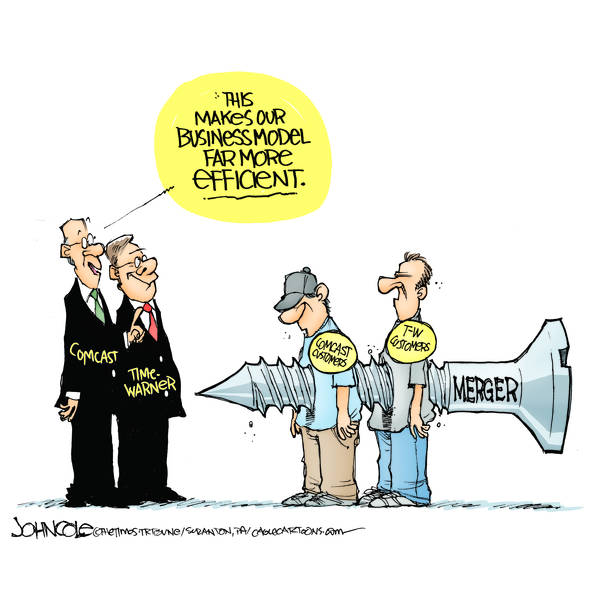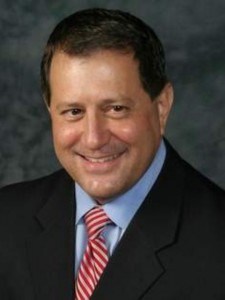[Ed. Note: New York’s DPS and PSC in this instance are synonymous.]
 Stop the Cap! agrees with the DPS staff’s conclusion that the petitioners (Comcast and Time Warner Cable) have failed to meet their burden of demonstrating that the transaction is in the public interest for New York residents.
Stop the Cap! agrees with the DPS staff’s conclusion that the petitioners (Comcast and Time Warner Cable) have failed to meet their burden of demonstrating that the transaction is in the public interest for New York residents.
However, we are concerned that the proposed mitigation strategies suggested by DPS staff are insufficient to remedy this. We also challenge some of the assigned values placed on Comcast’s “benefits” to produce a net positive for New Yorkers because the DPS staff is relying on incomplete information in assigning values and not accounting for additional costs that will be incurred by Comcast customers.
 First, the Commission must be aware that previous attempts to impose behavioral remedies on these types of mergers to generate net positive benefits have traditionally failed to protect consumers after the merger deals are approved. Professor John E. Kwoka, Jr., in his study, “Does Merger Control Work? A Retrospective on U.S. Enforcement Actions and Merger Outcomes,” [2] found numerous examples of mitigation strategies and conditional approvals that ultimately failed to protect ratepayers from the effects of a concentrated marketplace. Few businesses in New York are as concentrated as this state’s cable companies.[3]
First, the Commission must be aware that previous attempts to impose behavioral remedies on these types of mergers to generate net positive benefits have traditionally failed to protect consumers after the merger deals are approved. Professor John E. Kwoka, Jr., in his study, “Does Merger Control Work? A Retrospective on U.S. Enforcement Actions and Merger Outcomes,” [2] found numerous examples of mitigation strategies and conditional approvals that ultimately failed to protect ratepayers from the effects of a concentrated marketplace. Few businesses in New York are as concentrated as this state’s cable companies.[3]
Second, the DPS staff’s proposal that Comcast provide at least $303.5 million in incremental benefits to New York residents over the next ten years to realize our state’s share of benefits from the proposed transaction ignores Comcast’s ability to recapture those benefits through relentless rate increases, well in excess of the cost of providing the service.
The DPS staff has also elected to rely on the Federal Communications Commission to mandate conditions to mitigate potential risks of vertical market power. That is unwise and effectively forfeits the authority given to the Commission by the New York State legislature to protect the public interest of New York residents. The FCC does not have that responsibility.
Specific Objections and Concerns Regarding DPS Staff Recommendations to Create Public Benefits
- Investment
The staff has recommended that the combined entity must demonstrate a commitment to make new investments or invest beyond Time Warner’s current capital investment budgets.
The problem with this formula is that ordinary planned investments as part of creating new revenue-generating opportunities can be claimed as “extra investments” for the benefit of New Yorkers, despite the fact those investments would have been made with or without an agreement compelling the investment. It also ignores the impact New York cable subscribers care about the most – their rising monthly bill.
Comcast blames those rate increases partly on the cost of increased investment. In Portland, Ore. Comcast spokeswoman Theressa Dulaney blamed annual rate hikes partly on precisely the type of investments the DPS staff declares would be a net benefit to New Yorkers.
“We continue making investments in our network and next-generation technology to make enhancements customers want and value, including faster Internet speeds, more multiplatform video and better customer service,” Dulaney said in a written statement.[4]
Comcast has asserted it will increase capital spending to improve service for Time Warner Cable customers, but continues to ignore the fact Time Warner Cable’s own upgrade program meets or surpasses Comcast’s own menu of services often at a lower cost. New Yorkers will not benefit if Comcast’s investments yield only incrementally better technology, but at a significantly higher cost and a worse customer service experience. The Commission should at a minimum establish Time Warner Cable’s Maxx service and pricing as a benchmark when comparing the products and services of the two companies and demand Comcast do better.
- Cable television “enhancements”
 The DPS staff is correct to express skepticism about the relative benefits of Comcast’s expanded TV offerings, but then proceeds to declare the expanded programming an “incremental benefit for New York customers.”
The DPS staff is correct to express skepticism about the relative benefits of Comcast’s expanded TV offerings, but then proceeds to declare the expanded programming an “incremental benefit for New York customers.”
While the DPS staff seems willing to grant Comcast credit for service improvements, it seems to lack a willingness to “deduct points” when Comcast’s improvements come at a significantly higher price and does not consider the implications of Comcast’s current market testing of broadband usage control measures like data caps/thresholds will have on Time Warner Cable customers.
The DPS staff must take care not to assign a dollar amount of an incremental benefit in Comcast’s column, but not be willing to deduct or transfer those dollars back to the column representing New York residents faced with higher prices, service restrictions, or dramatically worse customer service.
For example, Comcast’s touted television enhancements promise what Americans have said they absolutely do not want – a bigger cable TV package and a growing cable television bill. According to the Washington Post, in 2012 U.S. cable subscribers got a record average of 189 channels in prepackaged bundles but watched only 17 of those channels.[5] And the appetite to view more channels, even when offered vastly more television content, hasn’t changed much in years. In five years, cable companies added 60 more channels for the typical subscriber, but viewers haven’t increased their consumption of new content. They have consistently watched an average of 17 channels.
But their cable television bill has dramatically increased. In Oregon, Comcast cable customers paid $41.55 a month for Comcast’s “Digital Starter” package in 2004. In 2013, the price increased to $70.49.[6]

Cohen
A-la-carte cable television is definitely not on the menu, despite consumer interest in paying only for the channels one wishes to receive.
As we noted in our previous filing[7], there are a range of other costs the DPS staff is not counting in its calculations:
- A transition to all-digital cable television imposes added consumer costs from required set top boxes or ancillary digital boxes that can manage Comcast’s encrypted television lineup. These costs start at $25 a year in additional outlet fees per connected television, or $75 if an average household’s three television sets are connected to cable;
- Comcast’s much-heralded X1 set top platform, a hallmark of its filing with New York regulators, includes an upgrade fee of up to $99 for the equipment – more than the cost of an entire month of cable television service;
- Comcast’s current market trials of “usage thresholds” which place an allowance on how much a subscriber can use the Internet before overlimit fees are charged applies to XFINITY on-demand video when a tablet, phone, or home computer is used to watch. Although Comcast’s online viewing options may be more plentiful, customers in these market trial areas have discovered a double-edged sword when online viewing erodes away their monthly Internet usage allowance.
Unfortunately, none of these additional costs or limits that could or are likely to be incurred by New York subscribers are accounted for in the DPS staff recommendations.
- Enhanced Wi-Fi Hotspot Deployment
DPS staff seems unaware the vast majority of Comcast’s Wi-Fi hotspot deployments come from Comcast residential customers sharing their Comcast-supplied network device with other Comcast customers. Comcast charges $8-9 a month to lease its wireless gateway that provisions an extra Wi-Fi signal available to guest users. But customers carry almost all of the costs –indefinite lease charges, installation, ongoing power use, and any potential security lapses.[8]
- DPS Staff Wrongly Offers Consumer Benefit Credits to Comcast for Improving Customer Service
 We strongly disagree with the DPS staff proposal to credit an overall consumer value of $50 million in return for Comcast’s commitment to improve its perennially terrible customer service rating.
We strongly disagree with the DPS staff proposal to credit an overall consumer value of $50 million in return for Comcast’s commitment to improve its perennially terrible customer service rating.
Comcast’s well-documented poor customer service record alone should be sufficient to demonstrate this merger in not in the public interest of New York. Crediting $50 million in consumer value if Comcast agrees to adhere to a customer service standard any company should meet as a normal cost of doing business is unacceptable.
Under the new Public Service Law, it is Comcast alone that must demonstrate its proposal is in the public interest. The DPS staff has determined it has not met that burden. This is an unfortunate example of DPS staff showing a willingness to tolerate Comcast’s current unacceptable customer service performance and transfer a portion of the consumer benefit credit New Yorkers should enjoy as a result of the merger just to cajole Comcast to meet minimal customer service standards sometime in the future.
Comcast should arrive in New York demonstrating a solid record of customer service before being granted approval of this transaction. It is not in the public interest to subject (even if temporarily) New York residents to an even worse customer service experience than they currently receive from Time Warner Cable. We are concerned about the appearance that DPS staff is offering mitigation strategies to Comcast to help it squeeze past a public interest test it has currently failed in their view.
The DPS staff has also provided no details about its proposed public benefit program. Since customers are the ones that will suffer as a result of bad customer service, any funds captured by New York from Comcast should be rebated in full to New York customers, not for any other purpose.
Comcast executives have made two public statements that should also be weighed carefully in any recommendations to the Public Service Commission:
- Comcast executive vice president David Cohen has predicted usage allowances will be imposed on all Comcast customers within five years.[9]
- “We’re certainly not promising that customer bills are going to go down or even increase less rapidly.”[10] Comcast executive vice president David Cohen
[1] http://documents.dps.ny.gov/public/Common/ViewDoc.aspx?DocRefId={0A5EAC88-6AB7-4F79-862C-B6C6B6D2E4ED}
[2] John E. Kwoka, Jr. and Diana L. Moss, “Behavioral Merger Remedies: Evaluation and Implications for
Antitrust Enforcement,” at 22, available at
http://antitrustinstitute.org/sites/default/files/AAI_wp_behavioral%20remedies_final.pdf
[3] John E. Kwoka, Jr., “Does Merger Control Work? A Retrospective on U.S. Enforcement Actions and Merger Outcomes,” 78 Antitrust L.J 619 (2013)
[4] http://www.oregonlive.com/silicon-forest/index.ssf/2013/08/comcast_cable_tv_rates_going_u.html
[5] http://www.washingtonpost.com/blogs/the-switch/wp/2014/05/07/cables-forced-bundles-are-getting-fatter-but-no-one-is-watching-more-channels/
[6] http://www.oregonlive.com/silicon-forest/index.ssf/2013/08/comcast_cable_tv_rates_going_u.html
[7] http://documents.dps.ny.gov/public/Common/ViewDoc.aspx?DocRefId={C6D8225D-7E82-4756-A715-AF9CC6CB76A5}
[8] https://arstechnica.com/information-technology/2014/06/comcast-raises-your-electric-bill-by-turning-router-into-a-public-hotspot/
[9]https://techcrunch.com/2014/05/14/comcast-wants-to-put-data-caps-on-all-customers-within-5-years/
[10] https://arstechnica.com/tech-policy/2014/02/comcast-no-promise-that-prices-will-go-down-or-even-increase-less-rapidly/


 Subscribe
Subscribe If this is the best Sprint’s Marcelo Claure can do, Softbank needs to keep shopping for another CEO.
If this is the best Sprint’s Marcelo Claure can do, Softbank needs to keep shopping for another CEO.


 David Cohen, executive vice-president, Comcast: “The combination of Comcast and TWC will create a world-class communications, media, and technology company to help meet the insatiable consumer demand for advanced digital services on multiple devices in homes, workplaces, and on-the-go.”
David Cohen, executive vice-president, Comcast: “The combination of Comcast and TWC will create a world-class communications, media, and technology company to help meet the insatiable consumer demand for advanced digital services on multiple devices in homes, workplaces, and on-the-go.” Comcast Press Release: “Through this merger, more American consumers will benefit from technological innovations, including a superior video experience, higher
Comcast Press Release: “Through this merger, more American consumers will benefit from technological innovations, including a superior video experience, higher 